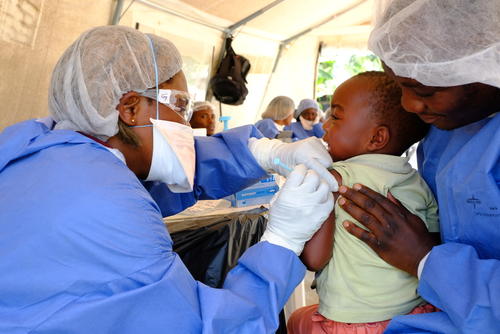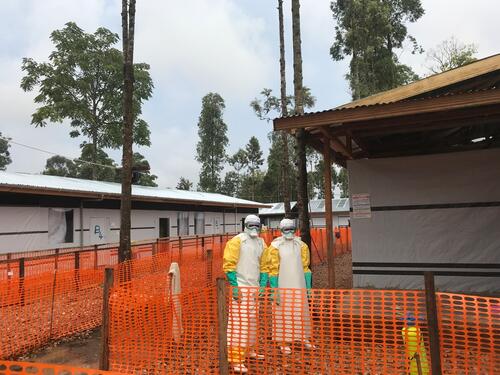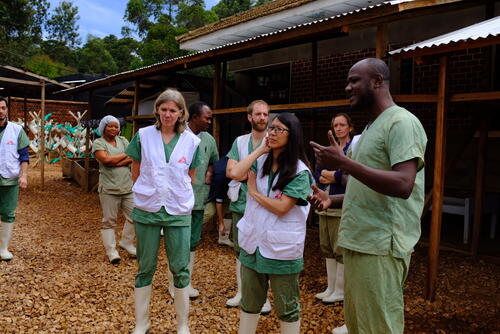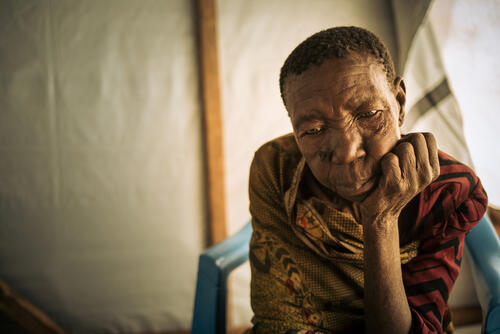Beni is one of the recurring hotspots of the current Ebola epidemic in North Kivu province of the Democratic Republic of the Congo (DRC). For more than a year, the outbreak response has been in full swing in the city.
On site since the early days of the epidemic, Médecins Sans Frontières (MSF) has recently started supporting vaccination activities, a promising tool in the fight against the virus disease. Yet reaching the right people in time is a complex endeavour.
Esther only winces slightly when a doctor from the vaccination team injects the investigational Ebola vaccine called rVSV-ZEBOV into her left upper arm in Kimbangu, a community in the southwest of Beni. Justin*, her two-and-a-half-year-old son, bursts in to tears when he sees a new syringe being filled, and only calms down a few minutes after receiving his shot.
The vaccine is painful in the arm, but the side effects are mostly mild. Early results show the vaccine provides effective protection for a promising 95 per cent of participants after 10 days.
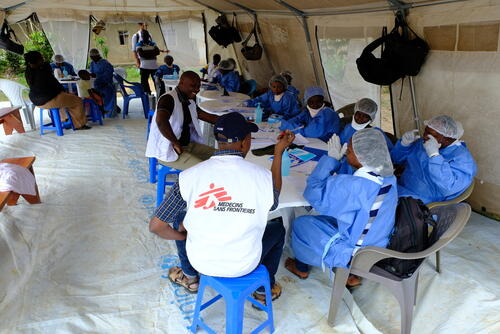
Contacts are vaccinated in a well-coordinated routine
Esther and her son came to one of three vaccination sites set up by MSF every day in Beni, as part of our latest efforts to contain Ebola with the response teams of the Ministry of Health and the World Health Organization.
“There was a confirmed Ebola case in my neighbourhood, and a surveillance team told me that we should get vaccinated as we are likely contacts,” Esther said.
Setting up the vaccination sites is a well-coordinated routine. A series of plastic tables are lined up next to a waiting area, registration and consent forms are put into place, and the vaccination team don protective gowns.
Then an MSF vehicle delivers the first vials of the vaccine in a cooling container and a member of the surveillance team starts identifying eligible people.
While Ebola cases have been on the decline in Beni since late August 2019, new suspected and confirmed cases are still being admitted to isolation zones in local healthcare facilities or the MSF-operated Ebola Treatment Centre (ETC) every day. Twice already, in December 2018 and June 2019, the outbreak seemed contained, only to flare up again with even higher numbers.
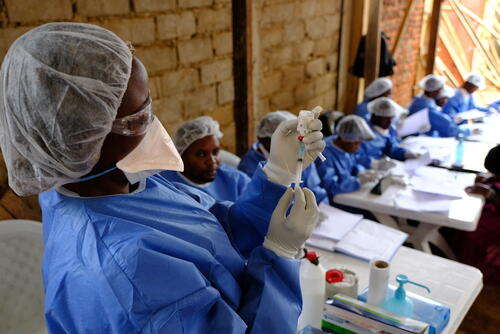
Ebola remains a deadly disease. Despite the availability of a vaccine to prevent infections and new treatments for confirmed patients, more than 3,100 people have been infected since the beginning of this tenth and biggest outbreak in DRC, and over 2,100 died as of mid-September.
Vaccination needs to be fast - but there's restrictions
Symptomatic patients with fever, diarrhoea, or vomiting are infectious and should be isolated and treated as fast possible. Yet throughout North Kivu, the average time span from suspecting to diagnosing an Ebola case is five days, during which patients often travel and visit several health centres.
Identifying and vaccinating contacts like Esther and Justin is therefore crucial to protect people at risk and poses one of the major challenges in containing the outbreak. The three MSF teams supported 700 vaccinations in the first two weeks of the vaccination campaign alone and over 51,000 people have been vaccinated in Beni by the national Ebola response and its partners so far.
51,000
51,
Nevertheless, due to the restricted use and investigational status of the vaccine, the vaccination strategy in North Kivu is currently limited to a ring approach.
Only direct and indirect contacts of probable and confirmed Ebola cases, or frontline workers like doctors and humanitarian staff, are targeted by the current campaign. Yet throughout the outbreak, national surveillance teams only managed to trace a quarter of known and probable Ebola contacts, while a majority remains unidentified or is never followed up.
Vaccination strategy needs to be expanded
MSF called for an international, independent committee to evaluate and extend the strategy and manage vaccine supplies more transparently.
“We would like to broaden our vaccination strategy and be more flexible in responding faster to health zones with confirmed Ebola cases, but are currently limited to a fix number of daily doses and working in pre-allocated vaccination sites,” said MSF activity manager Joseph Musakane.
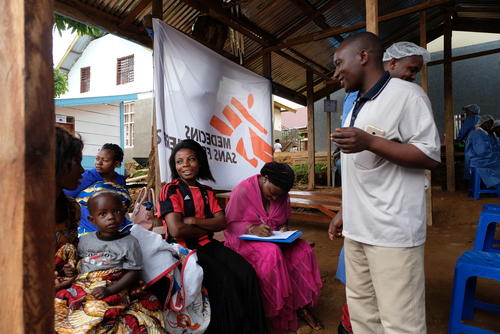
Persisting fears and misconceptions around the vaccine in local communities pose an additional challenge for vaccination teams.
“Many people believe the shot causes impotence, mental illness, or even Ebola itself,” said Joseph MbokaniI Kambale, a health promoter for the national Ebola response. “Others mistake Ebola symptoms for another disease or suspect poisoning and we often need to convince people to come and get vaccinated.”
Bringing outbreak response closer to communities
Making treatment more accessible and building trust with the local population proved equally important for patients with Ebola symptoms earlier in the outbreak. At first, our teams were working at a large central transit centre for suspect cases, but soon realised isolation capacities were much better positioned closer to communities.
“We started integrating small isolation structures into six of the eighteen health centres in Beni’s health zones, where patients and suspect cases felt more comfortable to present at the time,” said Tristan Le Lonquer, MSF emergency coordinator in Goma.
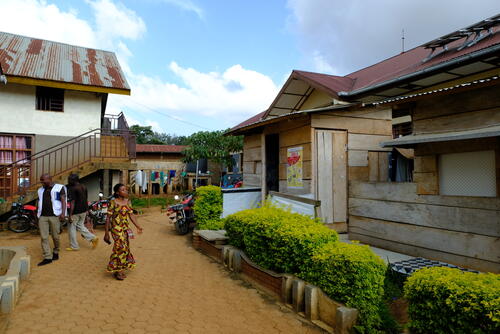
The health centres now also make for possible vaccination sites, offering a secure and sheltered space close to communities. At the same time, MSF strengthens the centres’ existing primary health care services.
“We support ambulatory patient consultations, maternity units, or laboratory capacities, which are much needed services at risk of being neglected during the complex Ebola response”, Le Lonquer said.
A second experimental vaccine requiring two doses given 56 days apart has just been greenlighted in DRC as part of an extended clinical trial, and MSF and our research arm Epicentre are part of the global consortium leading the rollout.
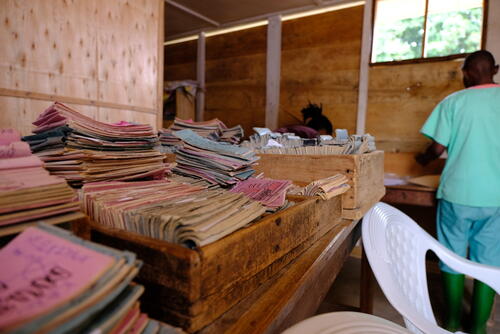
In Beni, ending the deadly Ebola epidemic remains complex task, and we have only recently taken over the large Ebola treatment centre with 13 isolation cubes for emergency care, three large isolation wards for up to 40 patients, and over 160 staff.
“Breaking the chain of transmission requires us to extend our vaccination approach, provide integrated isolation and treatment options, have a central ETC available, but also sustain other healthcare needs and build a relation of trust with the local community,” said Le Lonquer. “We need to be present on all fronts to win the complex fight against Ebola.”
* Names have been changed to protect patient privacy.



